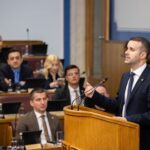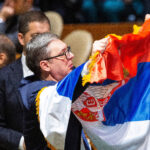- A New Government in Croatia Starts Its Work
On May 17, the Croatian Parliament voted for a new government, headed for the third time in a row by the current Prime Minister Andrej Plenković (HDZ).
79 out of 141 deputies presented at the session spoke “for”, 61 –“against”, one abstained.
The new government will have 18 ministries, 16 of which will be headed by representatives of the Croatian Democratic Community (HDZ), three – by representatives of HDZ’s coalition partner, the Homeland Movement (Domovinski pokret) (economy, agriculture and demography).
The four-year program of the new government was presented to the parliament. It contains five priorities: a successful, vital, fair, sustainable and sovereign Croatia.
For the first time in the last 8 years, the leading party of the Serbian minority in Croatia (SDSS), did not join the coalition with the HDZ. The non-entry of this party into the ruling majority was a condition of the right-wing patriotic Homeland Movement (Domovinski pokret), which is convinced that SDSS (Self-Democratic Serbian Party, Samostalna demokratska srpska stranka) is the successor of the political forces that supported the Serbian aggression against Croatia in the early 1990s.
Croatia’s new government was already criticized by left-wing Croatian politicians and Serbian President Aleksandar Vučić.
At the same time, SDSS leader Milorad Pupovac is optimistic. Commenting on the program of the new government, he noted, that it was a center-right political program that was similar to the one implemented by HDZ during the previous mandates, and which in general did not differ from the programs of other such parties in Europe. “The minority policy in the government’s program is defined in accordance with the best traditions of cooperation with this government,” Pupovac emphasized.
- The UN Security Council: the situation in Bosnia and Herzegovina is dangerous
Another report of the High Representative for Bosnia and Herzegovina, Christian Schmidt, to the UN Security Council regarding the situation in Bosnia and Herzegovina caused controversy among the meeting participants.
All permanent members of the UN Security Council, except for China and Russia, supported Schmidt’s Report in a half a year – from October 16, 2023, to April 15, 2024. The document criticizes the authorities of Republika Srpska, especially its president Milorad Dodik.
RS’ threats to block the work of state bodies are a threat to the functioning of the state, the High Representative emphasized, warning of the danger of establishing a parallel system in Republika Srpska. If these actions continue, they can lead to “the de facto, if not de jure, disintegration of the state of Bosnia and Herzegovina, which the president of Republika Srpska, Milorad Dodik, is constantly advocating,” Schmidt emphasized. “This would be a scenario with serious consequences,” he stressed.
Russia and China criticized the High Representative, blaming for destructive actions.
In addition, the planned consideration of the Resolution on the Srebrenica genocide at the UN General Assembly was met with indignation by the representatives of Moscow and Beijing, which considers it the main threat to peace and security in BiH.
- The UN General Assembly has scheduled a debate on the Resolution on the Srebrenica genocide on May 23
The Resolution on the International Day of Reflection and Commemoration of the 1995 Genocide in Srebrenica is adopted, the UN Representative of Bosnia and Herzegovina, Zlatko Lagumdžija, announced. The UN General Assembly will discuss the Resolution on May 23, 2024.
As you know, the document designates July 11 as the annual International Day of Reflection and Commemoration of the 1995 Genocide in Srebrenica. It condemns without reservation any denial of the Srebrenica genocide and actions that glorify persons convicted by international courts of war crimes, crimes against humanity and genocide.
Lagumdžija noted that the final version of the Resolution was adopted taking into account two additions, one of which was made by Montenegro.
The first amendment reads: “We reiterate that criminal responsibility under international law for the crime of genocide cannot be applied to any ethnic, religious or other community as a whole,” which essentially coincides with Montenegro’s proposal.
The second amendment reads: “We reiterate our firm commitment to support and strengthen unity in diversity in Bosnia and Herzegovina.”
Unity in diversity is not only the official motto of the European Union, but is also a characteristic of BiH as a European state based on such traditions, Lagumdžija noted.
Amendments to the Resolution is an attempt to refute Serbia’s accusation against the authors of the document regarding “attempts to label the Serbian people as genocidal” and statements about the B&H’s intention to build a unitary, “Bosnian” state.
Belgrade has very negatively perceived Montenegro’s amendment. President Aleksandar Vučić stated that Montenegro was conducting negotiations on amendments to the Resolution “without Serbia, but with other countries.” In his opinion, “someone did it to clear their conscience.”
Before traveling to New York, where the UN General Assembly will be held on May 23, Vučić took part in the Divine Liturgy in Saint Sava Church in Belgrade, where he asked for the blessing of Patriarch Porfiry.
- A draft Resolution on the Genocide in Jasenovac was submitted to the Parliament of Montenegro
The parliamentary majority submitted a draft Resolution on the Genocide in Jasenovac to the Parliament of Montenegro.
Earlier, the proposal to adopt a Resolution on Jasenovac (now Croatia), where there was a Nazi camp during the Second World War, was made by the head of the Assembly of Montenegro Andrija Mandić.
In response, Croatia has sent a note of protest to Montenegro. The note expresses indignation at the consideration of the Jasenovac issue in the context of the consideration of the Resolution on the Srebrenica Genocide. As stated, these two events had no any political-historical ties, and thus their combination did not mean the sincere honoring of the victims, the condemnation of crimes and the development of a culture of memory.
“The Ministry of Foreign and European Affairs of Croatia condemns attempts to use Croatia for domestic political purposes and hopes that Montenegro and its institutions will refrain from actions that would harm the future of bilateral relations, as well as on Montenegro’s European path,” the note says.
According to media, Croatia, as the EU member, actually warned Montenegro about possible blocking its European integration in case of manipulation with the genocide in Jasenovac.
- Greece can block the European integration of North Macedonia
Greece has warned North Macedonia that Athens will block its EU membership if it continues to violate the Prespa Agreement, which resolved a long-standing dispute over the former Yugoslav republic’s name six years ago.
“If some believe they can ignore the Agreement, they should understand that their path to Europe would be closed,” Kyriakos Mitsotakis said, speaking in northern Greece during his campaign ahead of June’s European Parliament elections.
Diplomatic tensions between Athens and Skopje escalated after the newly elected President of North Macedonia, Gordana Siljanovska-Davkova, called the country just “Macedonia” without “Northern” during her inauguration.
The leader of the center right VMRO-DPMNE party, Christian Mickotski, supported the term “Macedonia” instead of the country’s constitutional name. He praised Silyanovska-Davkova’s stance as “dignified” “If Greece believes that we have violated the Prespa Agreement, let it appeal to the International Court of Justice,” Mickotski said.
- The Western Balkans will join the EU together with Ukraine, Vučić believes
Serbian President Aleksandar Vučić is not sure that Western Balkan states will be able to join the European Union ahead of Ukraine. “Whether we join the EU alongside Ukraine is a whole other issue. You have your own opinion, but reason tells me I’m right. Of course, that’s what’s happening now. We will probably wait another six years, that is also good,” he said during the Western Balkans Leaders Summit in Kotor, Montenegro.
The Summit was dedicated to the discussion of the European Union’s Growth Plan for the Western Balkans, the continuation of the EU path by the countries of the region under the slogan “One Region, Common Vision”.
According to the President of Serbia, the EU Growth Plan for the Western Balkans will bring positive results in the region. “We appreciate and are grateful for the money, but more important are the structural reforms we have to implement, and we appreciate that very much,” Vučić said. He noted that Serbia would never oppose the importance of this initiative, although he made it clear that relations between Belgrade and Brussels were not having a great time: “Maybe the EU is that popular in your countries, but in mine it isn’t, just like we’re not popular even though we’re the largest part of this region.”
According to local observers, Vučić’s statement reflects the skepticism prevailing in Serbia regarding European integration. The Serbian authorities and a significant part of society consider the conditions that the country must fulfill for the EU membership – the normalization of relations with Kosovo and joining the EU sanctions against the Russian Federation – unnecessary and groundless.



